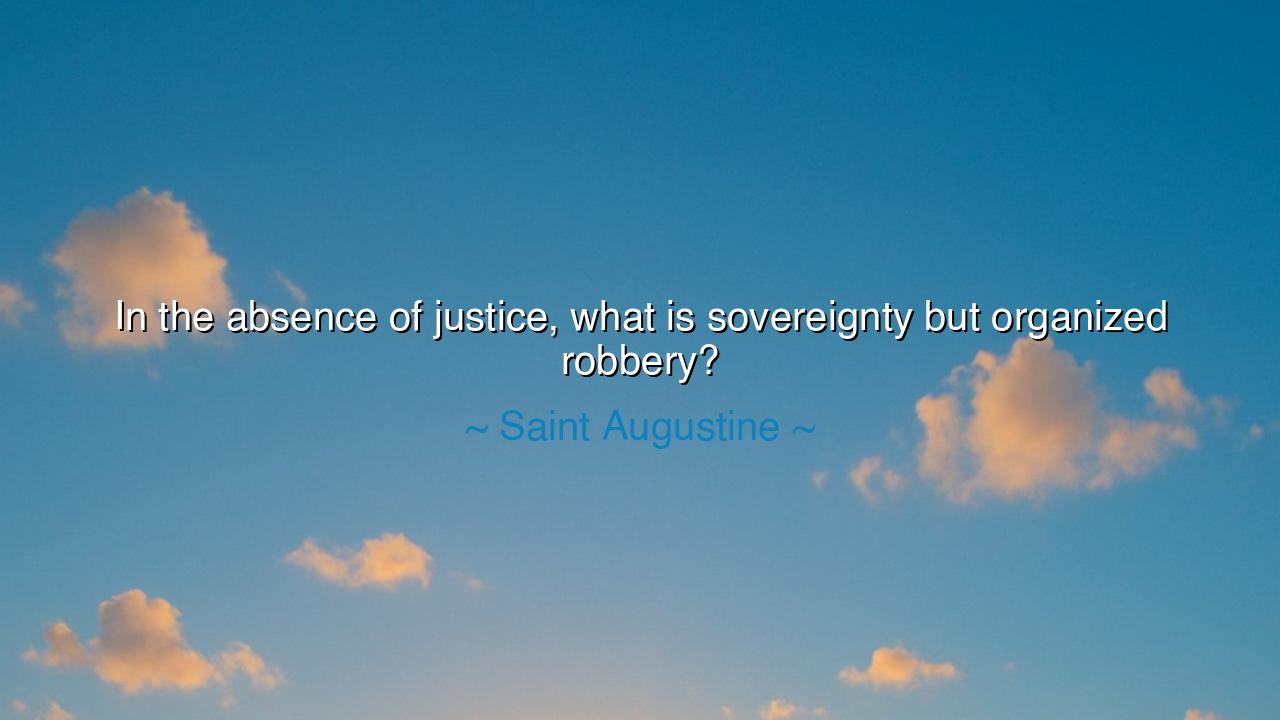
In the absence of justice, what is sovereignty but organized






When the Roman Empire trembled in its final days, and the world seemed to sink into shadow, a man of the cloth and of immense intellect — Saint Augustine of Hippo — wrote words that would outlive empires and echo through the corridors of all ages: “In the absence of justice, what is sovereignty but organized robbery?” These words were not uttered lightly. They came from the heart of a man who had seen kingdoms rise in splendor and fall in cruelty, who had watched Rome’s power crumble not by the strength of its enemies, but by the corruption of its soul. To Augustine, the question was not merely political, but eternal: What is the worth of power if it is divorced from righteousness? What is rule, if it does not serve the good?
The origin of this quote lies within Augustine’s monumental work, The City of God, written after the sack of Rome in 410 A.D. As the ancient empire that had ruled the known world lay in ruins, Augustine sought to explain why such greatness had fallen. Many blamed the new Christian faith; Augustine blamed the moral decay of the empire itself. He argued that without justice, no government — no matter how grand its armies or rich its coffers — could claim legitimacy. For justice, he said, is the very essence of right rule; it is what separates a kingdom from a band of thieves. Without it, the state becomes nothing more than organized robbery, a systematized plunder of the weak by the strong, cloaked in the false majesty of law and authority.
To understand his meaning, one need only look to the history of Rome itself. Once founded upon the virtues of discipline, duty, and law, it grew proud and corrupt. Its rulers taxed the poor to feed their luxuries, enslaved foreign peoples under the pretense of civilization, and called conquest peace. Armies marched under banners of justice, but their swords served greed. By Augustine’s reckoning, Rome — in its arrogance — became not the guardian of order, but the greatest thief in history, robbing nations of freedom, dignity, and faith. In its final hour, it was not defeated by barbarians, but consumed by its own injustice. Thus, Augustine spoke not merely as a theologian but as a historian of the human spirit: injustice is the ruin of all sovereignty.
His wisdom reaches beyond Rome, beyond the ancient world, into the very heart of all human rule. For the same truth has repeated itself in every age. Consider the vast empires of the modern era — the colonial powers that claimed to bring progress to foreign lands while stripping them of their riches and enslaving their people. They called it governance, they called it civilization, but Augustine’s words pierce through the centuries to judge them rightly: “organized robbery.” Power without justice is a thief that wears a crown; it conquers, but it does not govern; it rules, but it does not serve.
Yet Augustine’s teaching was not merely a condemnation — it was a revelation. He drew a sacred distinction between the City of Man and the City of God. The first, built on pride and domination, seeks glory and wealth; the second, built on humility and righteousness, seeks truth and love. A nation that builds itself on justice partakes in the divine order; a nation that forsakes it drifts into chaos. In this way, Augustine laid the foundation for the moral philosophy of all later civilizations — the belief that authority is legitimate only when it aligns with moral law. Sovereignty is not a right, but a trust; power is not ownership, but stewardship.
History offers us another echo of this truth. When Mahatma Gandhi stood against the British Empire, he did not raise armies, but principles. He accused the empire of injustice, declaring that a government that exploits and oppresses ceases to be moral, no matter its might. In his nonviolent defiance, Gandhi proved Augustine’s vision anew — that justice is the soul of legitimate power, and when it departs, the empire stands naked as tyranny. Gandhi, like Augustine, understood that it is not weapons that uphold nations, but righteousness.
The lesson, then, is as eternal as the dawn: justice is the breath of all good governance, the heartbeat of every true society. Without it, laws become chains, and rulers become thieves wearing robes of authority. Every man and woman, therefore, must serve justice not as a distant ideal, but as a daily duty — in speech, in work, in judgment. For when citizens uphold justice in their hearts, nations uphold it in their laws. And when rulers forget it, the people must remind them that power exists only to protect the weak and serve the truth.
So let the words of Saint Augustine be remembered as both warning and commandment: “In the absence of justice, what is sovereignty but organized robbery?” It is a question that every ruler must ask before taking the throne, and every citizen must ask before granting power. For justice is not the ornament of government — it is its foundation. Remove it, and all that remains is tyranny in disguise. But where justice reigns, even the humblest nation becomes great, and the kingdom of man begins to resemble, if only for a moment, the City of God.






AAdministratorAdministrator
Welcome, honored guests. Please leave a comment, we will respond soon